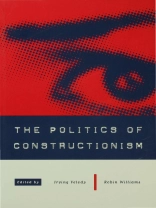This broad-ranging and clearly structured book critically overviews the many themes of social constructionism and its relevance to contemporary social and political issues. It brings together leading international contributors from across the social sciences, drawing on insights from psychology, sociology, politics, philosophy, cultural, gender and science studies.
Major questions and topics explored in its critique and application of constructionist ideas include the theory and practice of scientific method, the development of social and political policy, the use of social science statistical methods, self-identity and the politics of collective identities, and technological advances in reproductive medicine.
Tabela de Conteúdo
Introduction – Irving Velody and Robin Williams
PART ONE: FORMULATING CONSTRUCTIONISM
Towards a Constructivist Genealogy of Social Constructivism – Michael Lynch
Constructionist Dialogues and the Vicissitudes of the Politics – Kenneth Gergen
On Being More Literal about Construction – Ian Hacking
PART TWO: THE LIMITS OF CONSTRUCTIONISM
What Does the Sociology of Scientific Knowledge Explain? – Paul A Roth
The Reflexive Politics of Constructivism Revisited – Steve Fuller
Unconstructive – Wil Coleman and Wes Sharrock
The Limits of Social Constructionism – Stephen Turner
PART THREE: APPLYING CONSTRUCTIONISM
Relations, Communication and Power – Ian Burkitt
Social Constructionism and the New Technologies of Reproduction – Erica Haimes and Robin Williams
The Social Construction of Outliers – Sandy Lovie and Pat Lovie
Procedure, Reflexivity and Social Constructionism – Philip Manning
Social Constructionism as a Political Strategy – Tom Shakespeare
PART FOUR: THE POLITICS OF CONSTRUCTIONISM
Questions of Method – Mitchell Dean
Social Constructionist Political Theory – Craig Mackenzie
Constructionism, Authority and the Ethical Life – Thomas Osborne












